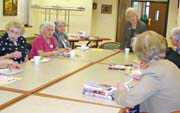The volunteers at the Adult Literacy Program at the Secaucus Library say they’ve learned just as much from their students as their students have learned from them.
“I love teaching the students. One woman I tutor taught me all about Indonesia – I had no concept about the place,” said tutor Helen Larson. “It’s very different from here.”
Larson has been volunteering at the Paterson Plank facility for the past three years. The retired Immaculate Conception School librarian said she wanted to share her skills with others so they would not become “dormant.”
The library offers free, one-to-one tutoring for adults. Literacy Coordinator Louise Rittberg said an extensive amount of literacy-related resource materials are available to anyone with a library card. She said the materials are beneficial to anyone interested in improving their comprehension, grammar, writing, or other reading or speaking skills.
The program was the brainchild of Hartz Mountain employee Charlotte Caminos back in 1993. Before she became library director, Kathy Steffens was part of the budding initiative, as was Rittberg. “The Rotary Club bankrolled us,” said Rittberg. “Things have changed quite a bit over the years.” Rittberg said the group’s first clients were people born in America. She mentions a local woman who wanted to change careers. The Real Estate agent wanted to become a Licensed Practical Nurse. She needed to learn to read the complex material required for nursing coursework. Reading skills in America are not as developed as one may think. The National Adult Literacy Survey conducted in 1992 showed a surprising 21 to 23 percent, or roughly 42 million American adults, function at the lowest level of English as a native language. “These days, we get mostly foreign-born [people] who are trying to learn English or improve their skills,” said Rittberg.
Tongue-in-cheek
The most common thing throwing many non-native speakers off is the vast amount of American idioms and slang. Phrases common in the workplace or street like “tongue-in-cheek,” “jump down someone’s throat,” “get off someone’s back,” and “not have a leg to stand on” can put a perplexed look on the face of someone not used to American word play.
“Most foreign-born can learn the grammar and such themselves but when it comes to spoken American English they become stymied,” Rittberg says. “They take most of the words literally.”
There are three private rooms equipped with computers for students and tutors use at the library. They are comfortable, pleasant and largely soundproof. The students meet with their tutors and can use the many interactive ESL (English as a Second Language) materials such as cassettes and CD-ROMs. They can also check out the books, tapes and learning packages for home use.
“There’s nothing like reading and then hearing the material. Students find that very helpful,” says Rittberg.
Help on the way
Jesus Antonio Espinosa came to live in Secaucus with friends in December. He works in finance in Bogotá, Columbia and came to America for a year to learn English. He has just completed his third tutoring session with Harold Roy, who recently retired from the pharmaceutical and engineering industry. The duo is a good fit. Espinoza speaks very little English. Roy spent 25 years living outside the United States and speaks fluent Spanish.
“This is very nice,” said Espinoza. “He makes it easier.”
Volunteer Nora Beale said it is often easier to teach someone with little or no English. One of her students, a professional from Columbia, has a master’s degree and can read English well enough. But when it comes to conversational English, explaining the nuances of the language can be “challenging.”
“If they don’t speak at all, I have a leg off – I can bring them along” said Beale. “But when the student knows a significant amount [of English], illustrating the fine points can be tricky.”
TRADING KNOWLEDGE – Tutor Helen Larson, right, and Indonesia native Noviyanti Kurniasare help each other learn about their respective native lands. Kurniasare came to the Secaucus Library Adult Literacy program to improve her English skills. Larson said she enjoys learning about other lands and customs.
